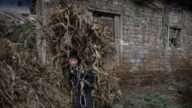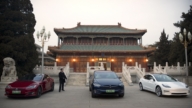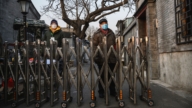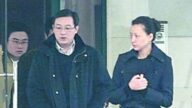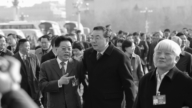【新唐人2012年11月22日訊】中共十八大之後的人事調整已經拉開序幕。政法委被降級,上海、重慶市委書記已經被調換。不過,外界認為,中共新一屆人事大換班,都是在缺乏公開和不合法的程序下操作,大換班就是一場權力的再分配。大陸民眾表示,現在當局打壓民眾一點都沒有收減,所以,在中共體制內誰上誰下,民眾已經不抱有任何希望,只等待像戈爾巴喬夫這樣的人物出現。
中共在十八屆代表大會上完成最高領導層換屆之後,開始進行新的重要人事部署。中共官方喉舌《新華社》20號宣佈,原吉林省委書記孫政才,接替張德江,出任重慶市委書記;上海市市長韓正兼任上海市委書記。
另外,中共國務委員、現任公安部部長孟建柱兼任政法委書記,取代已經卸任的周永康;而中共中央組織部部長李源潮的職務,將由在十八大上當選為中央書記處書記的趙樂際擔任。
針對中共十八大之後的這樣一個人事部署,大陸民主人士恩廣表示,中共從毛澤東開始就開始所謂的政治協商,沒有真正的民主議程。只是逐步的遺留,以這種方式一直走到今天。
大陸民主人士恩廣:「一個人也可以改變一個制度,一個制度也可以改變一個人,它們都是相互左右的。關鍵的問題是,最高決策他的胸懷有多大?又一個權力中心!他到了他能維護這個權力中心的時候,他能不能再…就像走蔣經國的路呢?」
恩廣指出,現在中國社會矛盾的激化,經濟逐步的衰敗,以及大規模土地收益已經到了極限,這種情況下,當局如果在行政支出方面還是大量增加,或不斷的增加稅賦,以及包括社保等不兌現的話,民眾肯定會抗爭。
而《紐約時報》報導說,如今,中國比任何時候都更需要優秀的領導人,來應對嚴峻的經濟、社會和政治問題。不過,大陸維權人士曹慶岩表示,上來的這一批人,老百姓都感到非常失望。
大陸維權人士曹慶岩:「老百姓本身都是些好人,只要是一加入共產黨了,他就壞了。這就出現甚麼呢?就是它本身的體制敗壞了。所以誰上來,只要是共產黨,老百姓都沒希望。中國如果真正的對老百姓好,就是共產黨不能存在,老百姓才能好。」
曹慶岩指出,雖然現在常委席次中拔掉了政法委,但是全國各地打壓老百姓的趨勢,只有上升,沒有改變。
曹慶岩:「經過我們了解,我們山東的有些地盤,只要上訪的,全部給控制在家了,就是不該給拘留的給拘留了,不該關的也都給關起來了,所以我們老百姓一看到共產黨,不管是誰上來幹,誰上臺?共產黨不徹底的改朝換代,這個共產黨在中國來說就是一個禍害。」
卸任前的周永康,曾兼任「中央政法委和綜治委」兩個機構的主任職務,管轄的部門包括中國公安、國安、檢察、法院、監獄等。這期間,社會維穩經費預算高達每年7000億元,超過官方公布的軍費支出。而且,在維穩的名義下,擴大警察系統權力,鎮壓政治異議人士和各界民眾,致使近年來中國社會群眾事件顯著增加。據統計,去年(2011年)中國大約發生18萬起民眾抗議事件。
大陸人士蔣先生:「本來公、檢、法應該像三國時魏、蜀、吳一樣,相互制約的。結果,它來個劉、關、張,桃源三結義!一家的嗎?司法獨立?司法不獨立,你說,不成個鬼笑話嗎?」
這位大陸人士蔣先生還指出,現在由於媒體和網路信息的傳遞,中國老百姓也不是那麼好糊弄了,都在覺醒。因此他表示,習近平能否成為中國的戈爾巴喬夫,百姓都在拭目以待。
採訪編輯/唐睿 後製/黎安安
China’s Mikhail Gorbachev Now Expected
Personnel appointment has kicked off in China after
the end of the 18th Chinese Communist Party Congress.
The role of CCP Central Political-Legal Commission (CPLC)
has been downgraded.
Shanghai and Chongqing have seen party chief reshuffles.
Commentators view the new round of personnel shifts as
lacking public scrutiny and legal procedure.
In other words, this is another round of power redistribution.
A mainlander reveals that the CCP crackdown has not yet abated.
And citizens no longer hold out any hope for CCP rule
they now only hope for a Chinese Mikhail Gorbachev.
After its top power handover, the CCP regime has started
other key leadership appointments.
On Nov. 20, CCP mouthpiece Xinhua News Agency declared
that Sun Zhengcai takes over as Chongqing Party chief,
Han Zheng, Shanghai mayor,
doubles as the city’s Party chief.
The current CCP police chief Meng Jianzhu replaces
Zhou Yongkang as new head of CCP Central Political-Legal Commission (CPLC).
Zhao Leji, CCP Central Committee secretariat, concurrently
serves as head of the Central Organization Department.
En Guang, a democrat in China,
comments on these new personnel assignments.
He says, the CCP regime’s political consultation system
has never gone through a real democratic process.
The practice started from the era of Mao Zedong’s rule,
and remains today.
En Guang: “A person can change a system,
and vice versa. Both can influence each other.
Now the problem is, the top ruler is nothing but a power
center. Will he employ his power in a way like Chiang Ching-kuo?"
En Guang says that social conflicts have peaked in China.
With economic slowdown and massive land sales,
civilians’ survival problems have been stretched to the limit.
If the authorities continue to expand administrative
spending, increase levy size, and
to default social welfare payments,
China will see a surge of mass protests, he thinks.
A commentary published on the New York Times said,
“the most capable leaders ever are needed now to tackle
China’s daunting economic, social, and political problems."
Cao Qingyan, rights activist in China, says that citizens
feel disappointed with the new CCP leadership team.
Cao Qingyan: “Ordinary people, once joining the CCP,
will turn sour. That’s because the system is bad in itself.
So whoever within the CCP will come into power
can offer no hope for it’s citizens.
True fortune will only fall on the Chinese people
when the CCP perishes."
Cao Qingyan reveals that the regime’s crackdown now
continues to grow across China,
even though the role of the CPLC has been ousted from
the CCP top ruling circle.
Cao Qingyan: “So far as we know, petitioners in some places
in Shandong have all been put under house arrest.
So for our civilians, as long as the CCP still rules China
There will be no radical change, it’s a disaster for the whole country."
Before leaving office, Zhou Yongkang concurrently served
as the head of both the CPLC and of internal security.
Under his jurisdiction are the organs of public security,
national security, procuratorate, courts, and prisons.
During Zhou’s tenure, the budget on stability maintenance
reached 700 billion RMB yearly, exceeding military spending.
In the name of stability preservation, Zhou Yongkang
expanded police power to repress dissidents and the populace.
This resulted in an upsurge of mass protests in China.
Public data show that in 2011,
some 180,000 mass protests took place in China.
Mr. Jiang (Citizen in China): “Checks and balances should
have existed among systems of public security, procuratorate and courts.
But now they have turned into three allies!
So how can we expect judicial independence in China?"
Mr. Jiang remarks that information exchange through media
and the internet have helped awaken Chinese citizens.
He says that now the Chinese people are all waiting to see
whether Xi Jinpin will become China’s Mikhail Gorbachev.


